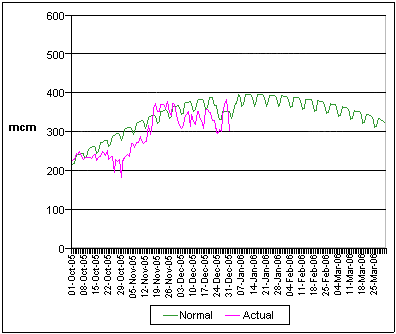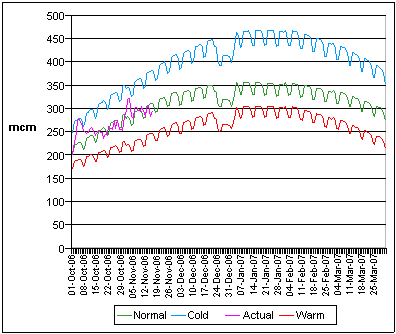EuroNews: November 17, 2006
Posted by Chris Vernon on November 17, 2006 - 4:45pm in The Oil Drum: Europe
British Energy Group Plc, the country's largest power producer, ousted the head of nuclear operations and said production will miss forecasts by at least 8.2 percent a year because of faulty reactors.This is really bad news for the winter. If the gas situation is anything like last year electricity shortages are likely.Annual production will be no less than 5 terawatt hours lower until at least March 2008.
Six of British Energy's 16 reactors are shut, with four down because of cracked boiler tubes. Production at two of its plants, which generate enough electricity to supply some 2.4 million homes, will be restricted for at least the next 16 months. This may undermine government efforts to promote building new reactors to replace aging units.
British Energy has 38 percent of its nuclear capacity out of service, or 3,620 megawatts from a total of 9,568 megawatts.
EUROPE’S oil refining industry is poised for a big upheaval as Royal Dutch Shell puts its French refineries up for sale. The Dutch multinational is pulling out of the refining market in France, seeking buyers for its three plants at Petit Couronne, Reichstett and Berre l’Etang.Shell’s move to reduce its European refining capacity follows BP’s decision in June to put its Coryton refinery in Essex up for sale. Shell has already taken steps to reduce capacity with the closure of Shell Haven.
Oil helps cut eurozone inflation
A drop in oil prices helped to slow the pace of inflation in the 12-nation eurozone in October, official figures have shown.Prices rose 0.1% during October, taking the annual inflation rate to 1.6%, just below September's figure of 1.7%. However, the underlying rate excluding energy and unprocessed food costs, increased from 1.5% in September to 1.6% in October.
Europe's biggest commercial solar energy site openes in Seville
The link includes a video from EuroNews. The new thermal solar tower installation is 11MW, saves 18,000 tonnes of CO2 per year, covers 60 hectares it using 600 mirrors to focus the sun to a central point generating temperatures of 400-500°C to raise steam and run a regular turbine. The company is planning 7 more plants taking capacity from 11MW to 302MW by 2010, enough to power 180,000 homes or a town the size of Seville, impressive.
UK Biofuel market 'grew fivefold in a year'
The bio-fuel market is expanding rapidly, with a fivefold rise in sales between 2004-2005, the Government said as it reviewed its non-food crops strategy.Trade and industry secretary Alistair Darling said: "Bio renewables have great potential for the economy and the environment. The growth we are seeing - a 75% increase in land being used for non-food crops in the last two years alone - is very encouraging. Increasingly the farming industry is seizing on its potential.
Russia ups oil output 2.3% in 9M06
Russia's oil production in January-September rose 2.3% to 357.7 million metric tons (2.63 billion bbl) year-on-year, the national statistics service reported Friday.
Italy's Eni reaches gas supply pact with Gazprom
Eni, the Italian energy company, and Russia's Gazprom on Tuesday finally signed a wide-ranging strategy pact to replace a gas distribution deal that collapsed last year.Under the terms of the deal signed on Tuesday, Gazprom will gain direct access to the Italian gas market. It will be able to sell up to 3bn cu m of gas in Italy a year from 2010, equivalent to about 3 per cent of the market and worth about €600m-€750m ($770m-$963m) a year.
However, EU officials have warned that bilateral deals with Gazprom undermine Brussels' efforts to work out a common policy towards Russia and its gas supplies. The EU has been pushing Russia to ratify an energy charter treaty that would provide access to Russia's reserves and remove Gazprom's monopoly of the export pipeline to Europe.
Economic Brief: The Uneasy Russia-E.U. Energy Relationship
Europe's reliance on Russia for 50 percent of natural gas imports -- half of which comes from Gazprom -- and 25 percent of its oil imports have sparked disunity among E.U. states. Vladimir Chizhov, Russia's ambassador to the European Union, said this of the matter: "We warned our partners in the European Union of the possible difficulties they might face after expansion, two years ago. We wish our partners the best of luck in resolving their internal problems."




A TOD EUROPE focusing on energy and related matters for Europe is very welcome.
Europe is more dependent on energy imports than the US, and energy imports relative growth is expected to be higher for Europe than for the US in the years to come.
--------------
The business with the nuclear power stations in the UK are IMO serious, as this could increase demand for electricity from nat gas, and I expect the nat gas situation in the UK to become (mildly put) very, very tight during Jan/Feb of this heating season. As far as I can understand even worse than last heating season, even with the gas storage at Rough operating satisfactorily.
Judging from the web page to National Grid (which is updated daily) it looks that so far, this fall has been warmer than normal, but still the nat gas consumption has been running close to a normal weather pattern.
This could suggest higher weather adjusted nat gas consumption.
-
Here's the live National Grid page: Daily Summary Report
Here's the normal demand curve for last winter:

And here are the curves for this winter:

And NGM2 - are you doing anything with the UK gas supplies data you were working on. I've been down the DTI office transcribing by hand the pre-1995 gas production data - cos that's not on their web site.
Should also mention, in London last week - one of the speakers used a number of your slides - they were acredited - but folks were wondering who you were.
Yes, I confirm that I am in the process of putting together a draft about historical (from about 1996 till about now) UK nat gas supplies with a look into the near future, towards 2010. As you are aware UK nat gas supplies are very complex and it is time-consuming to put together a good presentation from several open sources (among them DTI, BP statistical Review, Norwegian Official statistics and press releases from buyers and sellers of (Norwegian) nat gas) that can stand up to the verification of independent third parties.
I can tell you this much that the report describes a supply situation that mildly put will become ugly and stay this way (and has the potential to grow worse) for many years.
I sincerely hope to be proven wrong on this, but by following the UK nat gas supply situation for some time coupled with a strong professional background from nat gas logistics (among a lot of other professional exposures within the oil and gas operators) for several years have made me arrive to these dire conclusions.
Due to recent other higher prioritised activities, the progress on this for the last 4 - 5 weeks has been slow, but it now looks like I could have a draft ready by the next few days about this subject. (I think this is far more important to publish and initiate discussions on than the other post I am working on.)
The development in the UK nat gas supply situation will also affect Continental Europe from next summer (more details and reasoning in subject report) as UK for some years has been net exporter of nat gas to Continental Europe and Ireland.
Judging from the demand curves published on the National Grid web page and present storage level (4 000 million cubic meters) and that present flow into UK is running steady at 300 million cubic meters a day, it could be that storage facilities could be emptied by second half of February under normal weather (consumption) conditions.
You can make independent assessments and see for yourself what you arrive at.
I will forward you both a copy of this report (draft) and then you can evaluate if it's worthy to publish on TOD Europe.
I will as earlier promises complete my post on development in net global oil exports and how the price increases redistributes the flow between OECD, China and ROW (Rest Of World) for posting on TOD. Truth is I have been kept quit busy for a while.
I was made aware that Chris Skrebowski had used (kindly and wisely) several of the diagrams developed by me for www.energikrise.blogspot.com in his presentation at the EI on Nov. 07.
A lot of people (I mean really a lot) are wondering about my true identity, and I have for some time, and will continue for the foreseeable future to use anonymity through the signature Energimann.
(Sorry if my English is a little slippery to day, truth is I am in a hurry to meet several friends for some well-deserved beers accompanied with some "Akevitt" chasers.)
Regards
Energimann
NGM2
By the way I could use a crash course on some HTML codes used for posting comments on TOD.
Click for full details
They are suggesting February could be the coldest since 1991.
And they are ugly too.